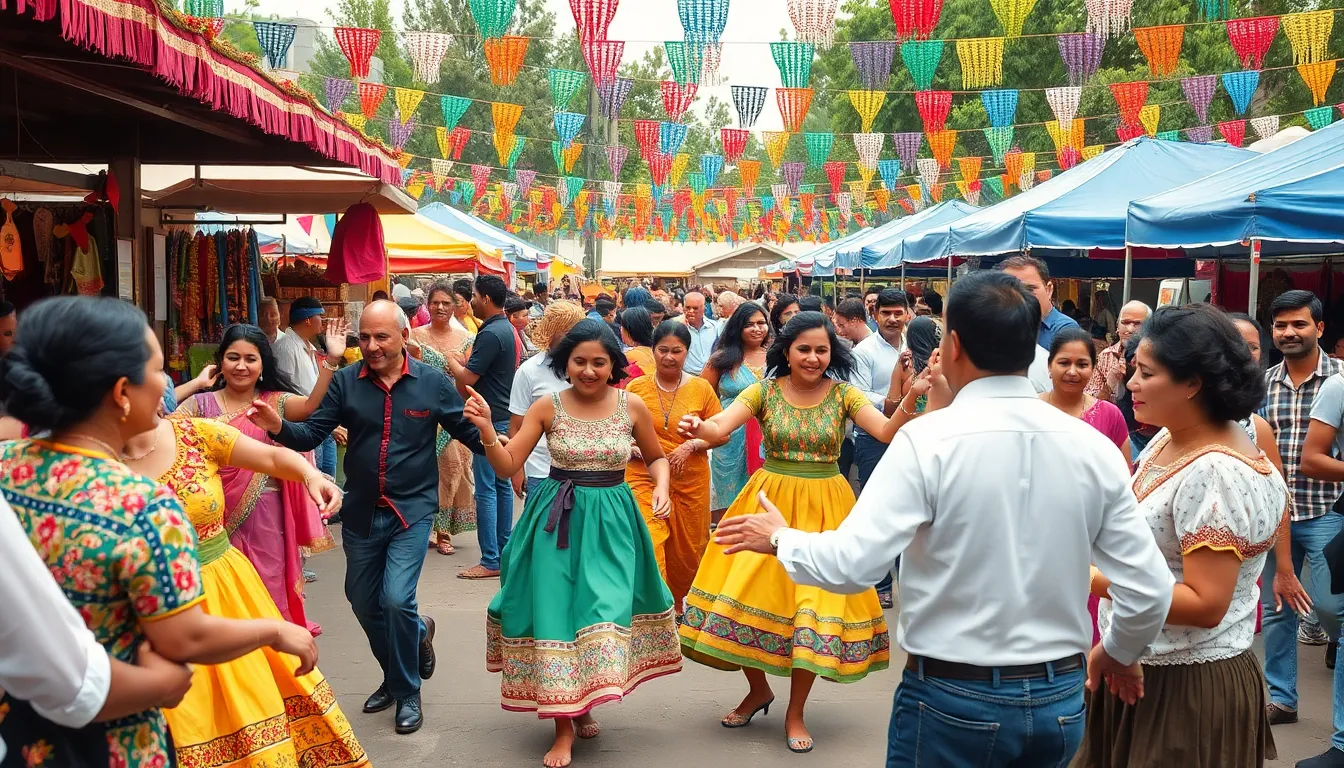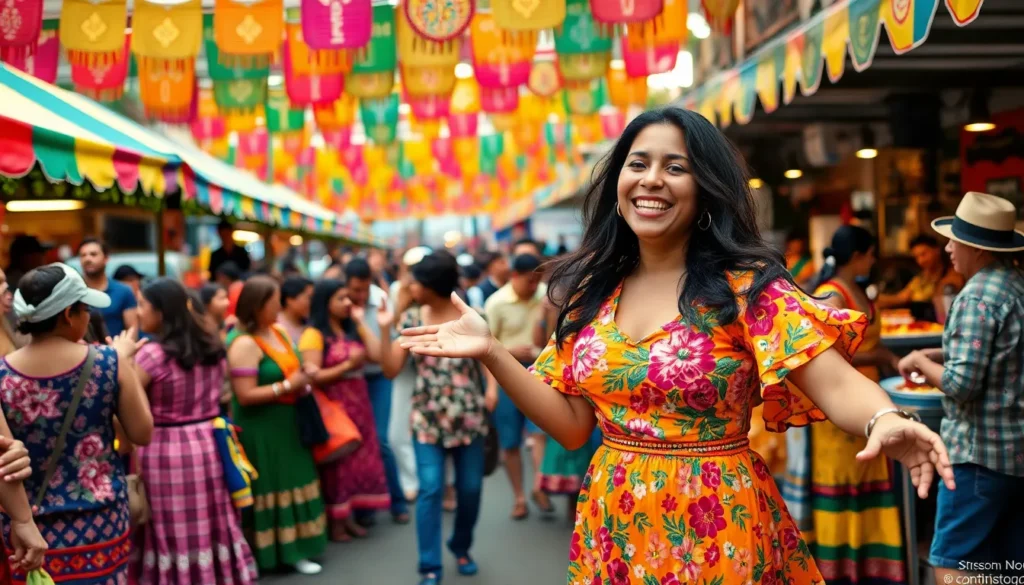Cultural festivals are like a buffet for the senses, offering a delightful mix of sights, sounds, and tastes that can make anyone’s heart dance. From vibrant parades filled with colorful costumes to mouthwatering food stalls that tempt even the pickiest eaters, these events celebrate the rich tapestry of human expression. It’s the one time when it’s perfectly acceptable to wear a feathered hat while munching on fried dough and shouting at a parade float.
Table of Contents
ToggleOverview of Cultural Festivals
Cultural festivals serve as vibrant celebrations that unite communities and display diverse traditions. These events often feature colorful parades, showcasing traditional attire and local artistry. Attendees experience a rich tapestry of sounds, from live music to performances that resonate across cultures. Various culinary delights also take center stage, inviting guests to savor unique dishes and flavors specific to the region.
Festivals like Diwali and Carnival not only highlight local customs but also promote inclusivity. Participants engage in activities, fostering connections among people from different backgrounds. Events frequently occur annually, drawing locals and tourists eager to be part of the excitement.
Celebratory activities are common, with music, dance, and art playing vital roles. Workshops and exhibitions often accompany these festivals, offering participants hands-on experiences. Authentic storytelling enhances the experience and preserves cultural heritage, allowing attendees to learn the significance behind traditions.
The joy of cultural festivals extends beyond entertainment; they stimulate local economies. Vendors at these events gain visibility, while local artisans showcase their crafts. Tourist influx during festival seasons contributes to hospitality and service industries, increasing overall economic activity.
In essence, cultural festivals represent more than mere gatherings. They embody identity and shared values, providing opportunities for expression and community bonding. Embracing cultural diversity through festivals strengthens societal ties, fostering mutual understanding and appreciation across different groups.
Importance of Cultural Festivals

Cultural festivals play a crucial role in society, serving as vibrant platforms for expression and community connection.
Preserving Traditions
Traditions find a voice during cultural festivals. Festivals provide opportunities for storytelling that relay historical significance and cultural narratives. Families often pass down recipes, music, and dance forms that define their heritage. Attendees witness traditional attire and artwork, which reflect unique regional identities. By showcasing heritage, these events ensure ancestral knowledge isn’t lost. Festivals like Chinese New Year and Día de los Muertos highlight specific customs and rituals, emphasizing the importance of cultural continuity. Through these celebrations, younger generations can embrace their roots and develop a sense of pride in their cultural identity.
Promoting Community Engagement
Community bonds strengthen through cultural festivals. These events invite participation from local residents, fostering interaction among diverse groups. Volunteers often contribute time and skills, enhancing the festival experience. Vendors provide local culinary specialties, further promoting economic involvement. Attendees engage with art exhibits and performances, enjoying shared experiences that deepen connections. Cultural festivals like Made in America and the Albuquerque International Balloon Fiesta draw large crowds, encouraging socialization and cooperation. Relationships that form during these gatherings often translate into lasting friendships and collaborations, enhancing community unity and pride.
Types of Cultural Festivals
Cultural festivals encompass a range of vibrant events that celebrate various aspects of society. These occasions reflect the unique traditions and customs that define communities across the globe.
Music Festivals
Music festivals serve as platforms for artists and attendees to connect through the universal language of sound. They showcase diverse musical genres, from rock to folk to electronic, inviting a wide audience to participate. Events such as Coachella and Glastonbury feature both established and emerging artists, creating excitement among fans. Attendees immerse themselves in live performances, dance, and communal joy, fostering an appreciation for artistic expression. Vibrant atmospheres often lead to new friendships and shared memories, strengthening community bonds.
Food Festivals
Food festivals highlight culinary diversity and showcase local specialties. These events celebrate regional flavors, allowing attendees to taste various dishes prepared by local chefs and vendors. Festivals like the Taste of Chicago and the New Orleans Jazz and Heritage Festival attract food lovers eager to explore unique flavors. Cooking demonstrations, workshops, and tastings enrich the experience for participants. Engaging with different cuisines promotes cultural exchange and understanding, ultimately uniting people through their shared love of food.
Art and Craft Festivals
Art and craft festivals emphasize creativity and cultural heritage, featuring local artisans and their unique creations. These events provide platforms for artists to display their work and engage with the community. Festivals like Art Basel and the Renegade Craft Fair showcase a wide variety of artistic expressions, from paintings to handmade goods. Workshops encourage visitor participation, fostering a deeper appreciation for the creative process. Such gatherings also stimulate local economies, supporting artists and artisans by providing opportunities to sell their work.
Notable Cultural Festivals Around the World
Cultural festivals celebrate heritage and traditions across the globe. These events highlight unique practices, bringing communities together in joyful celebrations.
Diwali in India
Diwali, the Festival of Lights, marks the triumph of light over darkness, celebrated by millions in India and beyond. This five-day festival features vibrant rituals, intricate rangoli designs, and the lighting of diyas (oil lamps). Families gather to exchange gifts, sweets, and celebrate with feasts showcasing regional dishes. Fireworks light up the night sky, creating a dazzling display that adds to the festive atmosphere. Temples and homes transform with decorations, inviting blessings and prosperity. Diwali creates a sense of unity, reminding participants of shared beliefs and cultural values.
Carnival in Brazil
Carnival in Brazil showcases a spectacular fusion of music, dance, and colorful parades. This world-renowned festival occurs annually before Lent, attracting millions of locals and tourists alike. Samba schools compete in rhythm and creativity, presenting elaborate floats and costumes during parades. Street parties ignite vibrant celebrations, allowing attendees to dance freely and enjoy various local foods and drinks. The infectious energy of the festival fosters connections among participants, breaking down cultural barriers. Carnival serves as a global cultural phenomenon, highlighting Brazil’s diverse heritage.
Oktoberfest in Germany
Oktoberfest in Germany stands as the world’s largest beer festival, drawing millions from around the globe. Held annually in Munich, this 16- to 18-day event celebrates Bavarian culture through traditional foods, music, and, of course, beer. Visitors enjoy pretzels, sausages, and local specialties while participating in folk dances and live performances. Massive tents host brewers showcasing regional beers, inviting attendees to savor different flavors. Oktoberfest enhances community spirit, emphasizing camaraderie and shared experiences among diverse attendees. This festival highlights Germany’s commitment to tradition and hospitality.
Cultural festivals are more than just celebrations; they’re vital expressions of community and identity. These events foster connections among diverse groups while preserving traditions and encouraging participation. By engaging all senses through music, food, and art, they create memorable experiences that resonate with attendees.
As communities come together to celebrate their unique heritage, they also stimulate local economies and promote cultural exchange. The joy and unity found in these festivals not only enrich individual lives but also strengthen societal ties. Embracing cultural diversity through these vibrant gatherings paves the way for mutual understanding and lasting friendships.





